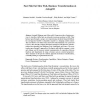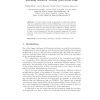224
Voted
BPM
2015
Springer
9 years 10 months ago
2015
Springer
Abstract. Business process models are key artifacts in business process management. The technical support of the process of process modeling is important for the quality and the ap...
171
Voted
BPM
2015
Springer
9 years 10 months ago
2015
Springer
Current process discovery techniques focus on the derivation of a process model on the basis of the activity relations extracted from an event log. However, there are situations wh...
195
Voted
BPM
2015
Springer
9 years 10 months ago
2015
Springer
The Declarative Process Intermediate Language (DPIL) is a declarative process modelling language that allows for specifying multiperspective and multi-modal agile, i.e., flexible,...
BPM
2015
Springer
9 years 10 months ago
2015
Springer
70
Voted
BPM
2015
Springer
9 years 10 months ago
2015
Springer
Dynamic growth of digitized information creates space for systematic collection of data related to business processes. Extraction of this data is an enormous challenge because many...
76
Voted
BPM
2015
Springer
9 years 10 months ago
2015
Springer
Abstract. The performance of scheduled business processes is of central importance for services and manufacturing systems. However, current techniques for performance analysis do n...
BPM
2015
Springer
9 years 10 months ago
2015
Springer
The concept of the Standardized Individual Output Development can generally be understood as an approach to the development of output using its own domain standards, or re-use of s...
BPM
2015
Springer
9 years 10 months ago
2015
Springer
In this work we present an approach to extract the business logic of an application based on its generated logs. To do so we use process mining techniques to extract the model from...
69
Voted
BPM
2015
Springer
9 years 10 months ago
2015
Springer
Abstract. Conformance checking, a method of process mining, is commonly used to assess how well a set of historic log traces fits a given process model, or vice versa. Here we exp...
83
Voted
BPM
2015
Springer
9 years 10 months ago
2015
Springer
This paper addresses the problem of explaining behavioral differences between two business process event logs. The paper presents a method that, given two event logs, returns a set...



